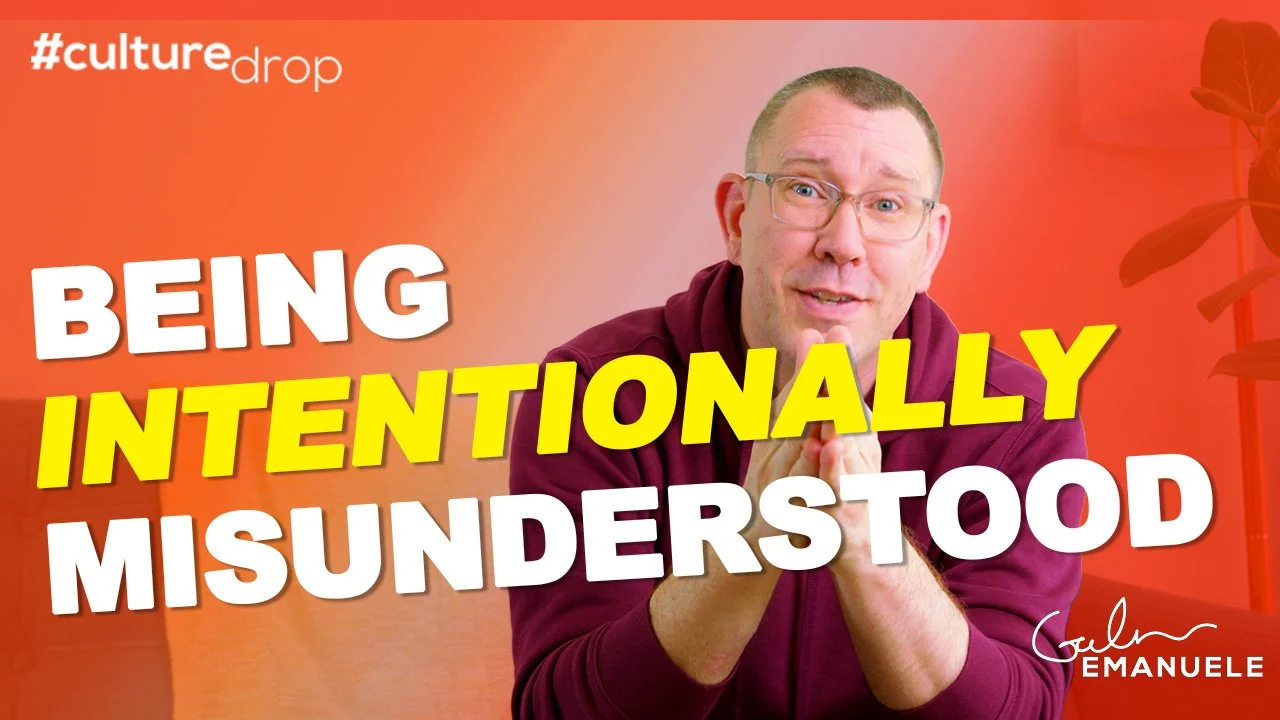Being Intentionally Misunderstood by Difficult People
Welcome to the #culturedrop. Every Tuesday, Galen Emanuele emails tools to advance leadership skills, team culture, and personal growth. No spam, just great content. Sign up now to get it in your inbox.
If someone intends to misunderstand you, they will.
Not everyone is difficult, but dealing with difficult people is inevitable. Whether it’s a co-worker, a boss, a client, or someone in your personal life, we’ve all encountered people who seem to thrive on conflict, misinterpretation, or unnecessary drama.
There’s a perspective I’ve found helpful to keep in mind when dealing with these situations, and it’s this: you don’t have to say things perfectly to be understood. This idea can save you a lot of mental stress, especially when you're interacting with someone who seems to turn every small issue into a major conflict.
The simple truth is that if someone is committed to misunderstanding you, they will. It doesn’t matter how gently or perfectly constructed your words are.
“If someone is committed to misunderstanding you, they will. It doesn’t matter how gently or perfectly constructed your words are.”
The trap of perfection.
When we’re around someone who reacts poorly — no matter what we say or how gently we say it — it’s easy to fall into the trap of overthinking. We start crafting every sentence with great care and delicacy, hoping that if we just say it exactly right, we can avoid conflict.
However, if their default mode is to take things personally, turn statements into attacks, or stir up drama, then even your most carefully crafted message won’t land the way you intended. They will find offense because they are looking for it.
On the flip side, when you're dealing with emotionally intelligent, well-intended people, you don’t need to phrase things perfectly. You can stumble through your words, say something clunky, or even slightly miss the mark because when someone is trying to understand you, they will.
They’ll ask clarifying questions, assume good intent, and turn your imperfect delivery into something they can work with to resolve things.
You can’t control their reaction, only yours.
An important thing to keep in mind to reduce the amount that you suffer or agonize over interactions with people like this: you can’t control how someone hears and reacts to you.
You can’t control whether they’re the kind of person who listens with curiosity or listens to be offended. Or if they’re the kind of person would prefers drama to peace. What you can control 100% is how you show up, how you express yourself, and how much energy you give to engage in someone else's drama.
“Treat other people based on who you are, not who they are.”
Some people choose to be difficult. Some people feed off of emotional chaos. That’s their choice. You don’t have to get swept into it. Let go of the idea that if you "say it just right," they’ll behave better. That’s not your responsibility. Treat other people based on who you are, not who they are.
The flip side: don’t be that person.
A parting note — don’t be the difficult person in someone else’s story.
We all have people we just tend to butt heads with, and moments where we misread someone, jump to conclusions, or assume bad intent. But whenever you can, extend grace and let people say things imperfectly. Don’t read people in the worst possible light and look for offense where there isn’t any. Ask questions. Assume people are well-intentioned and doing their best until you have a clear reason to believe otherwise.
“Assume people are well-intentioned and doing their best until you have a clear reason to believe otherwise.”
If you intentionally try to understand someone, and to create and keep peace, you will succeed far more often than you fail there.
Does this mean tolerate any level of bad behavior at all costs? Obviously and absolutely not, It means don’t start or go looking for trouble when there is any other way forward.
Life is hard, people are hard, workplaces can be hard. Look for ways to make it easier.
Related Blogs:
The 6 Dos and Don'ts of Conflict
Passive Aggressive Workplace Behavior
Want more?
This article was created by Galen Emanuele for the #culturedrop. Free leadership and team culture content in less than 5 minutes a week. Check out the rest of this month's content and subscribe to the Culture Drop at https://bit.ly/culturedrop








